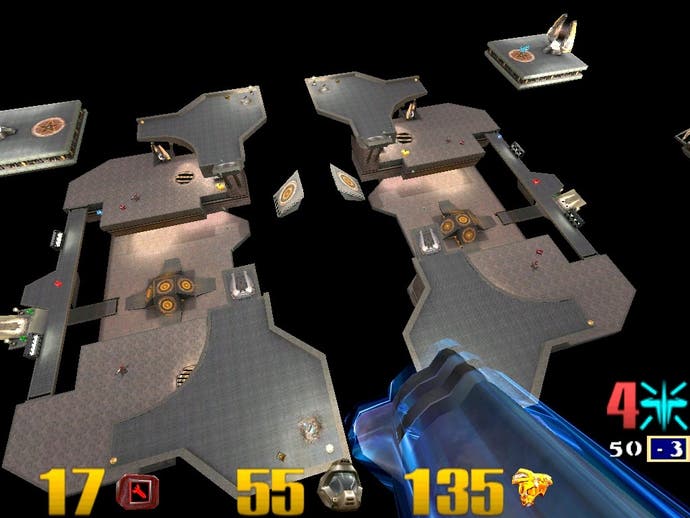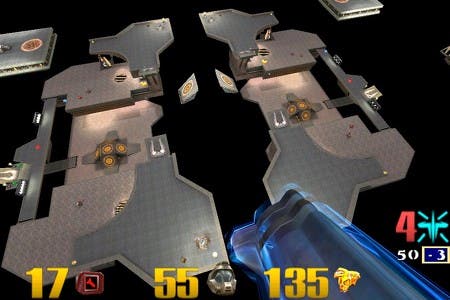FPS games like Quake 3 died because consoles competed with movies
It became about entertainment, not skills, ShootMania dev says.
The big FPS rivalry of 1999 was fought between two games that decided to ditch single-player campaigns and focus on the future - on being multiplayer and competitive. They were Quake 3 and Unreal Tournament.
The big FPS rivalry of 2011 was fought between Call of Duty: Modern Warfare 3 and Battlefield 3 - modern war games with glitzy cinematic campaigns, as well as multiplayer.
What happened - why did the forward-looking competitive FPS games of yesteryear die out?
"This isn't going to be nice for console makers, but it's because consoles are giving so many opportunities to tell stories, and to be triple-A, monster games, that you had to have a lot of stuff to beat the competition all the time," Anne Blondel-Jouin told Eurogamer. She's the managing director of Nadeo Live!, the marketing half of Nadeo, developer of TrackMania and ShootMania.
"So, it was not about skills any more.
"I'm not saying that you're not skilled when you're playing such games, but it was more that they were competing against movies, so they had to put up all of the nice stuff, all of the production values, and it kept growing and growing and growing. And the consoles were enabling that.

"People kind of forgot a little bit about what FPS was all about at the beginning. I wouldn't say it's because of them [consoles], but it's one explanation, that the consoles were competing against movies and other forms of entertainment - that they had to entertain people rather than go back to the pure skills of playing."
ShootMania aims to distill and refine what Quake 3 and Unreal Tournament began, even though Nadeo wasn't apparently directly inspired by those titles.
"We are in a transition year, as you know, so we're all waiting for next consoles to get out. We don't know when they will be out, but we know they're coming. There's a tendency in the games industry when they know that's happening that people are returning, massively, to PC games."
Anne Blondel-Jouin, managing director, Nadeo Live!
But those games died out for a reason - tastes changed, no? What makes Nadeo think people want a game like ShootMania now?
"Two reasons," answered Blondel-Jouin.
"First one is that we are in a transition year, as you know, so we're all waiting for next consoles to get out. We don't know when they will be out, but we know they're coming. There's a tendency in the games industry when they know that's happening that people are returning, massively, to PC games.
"We also looked at what was on the market, in terms of a pure skilled FPS, and I have to say that they used to have a lot of them, but they are quite old right now, and people are looking for some freshness.
"It's about being in the right place at the right time, and we are lucky enough to be there."
Whether ShootMania itself will ever be a console game will be a question for next-generation.
"So far we feel we cannot go on consoles," Blondel-Jouin said, "because we feel that they're not opened enough for the players to express their creativity, or the game the way we want it to be enjoyed.
"But if the next ones are more open, maybe - we don't know.
"So far, we want to make sure we're giving the PC players, who've been with us for so many years, what they deserve and what they want, and then we'll see what happens with the console. But there's no rush on our side on being on consoles at all."
ShootMania looks and play simply. You have the ability to fire rockets and a rail gun. It's a multiplayer FPS that's understandable at first glance. But depth comes with skill, and variety comes with game types. The other side to ShootMania is that players can make and share their own maps, as they can in TrackMania. This will be done via a central hub called ManiaPlanet, which all Nadeo's games will interact with.
ShootMania went in to closed beta earlier this month, and the plan is "definitely" for a full game launch this year. Nadeo doesn't want to spend less than three months in beta, but that could stretch out to six. The date's not yet set in stone.
"We're lucky enough that Ubisoft is letting us do that [take our time]. It's a luxury for us, but it's great that Ubisoft understand that, and is not rushing us anywhere," Blondel-Jouin said.
ShootMania: Storm will cost £15.99, like TrackMania 2: Canyon. Also, the "Storm" and "Canyon" parts of the respective game names refer to title packs, which are paid expansions. The next TrackMania 2 title pack is called Valley, and will be released this year.
Nadeo plans two other title packs for ShootMania, Blondel-Jouin told us.
Nadeo has a third game called QuestMania on the slate. TrackMania is the racing series, ShootMania is the FPS and QuestMania is the RPG. All three games use the same engine and also link to ManiaPlanet, therefore any work on any game usually benefits everything else.
"[QuestMania] is coming along very well, but it's obviously taking a lot of time to come, because it's an RPG, and it's true that right now we're focusing much more on ShootMania and making sure that TrackMania 2: Canyon is still bringing more stuff to the players."
It's "a little bit too early" to talk specifically about QuestMania but, broadly, Nadeo hopes that game will do for RPGs what TrackMania did for racing games and what ShootMania looks to be doing for FPSs - that is, whittling back features to get to the core experience.
TrackMania 2: Canyon, a racing game that involves puzzle solving, was awarded a humongous 9/10 by Eurogamer. Sales were "over expectations", Blondel-Jouin said, and it's enjoying a long shelf life through continued sales.
The 30-person Nadeo team, which was only 18 when TM2: Canyon was made, expects that ShootMania will sell in "much higher" numbers, and maybe even help Nadeo break into America.

